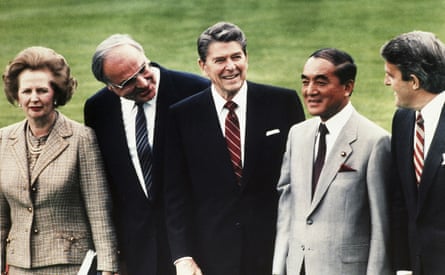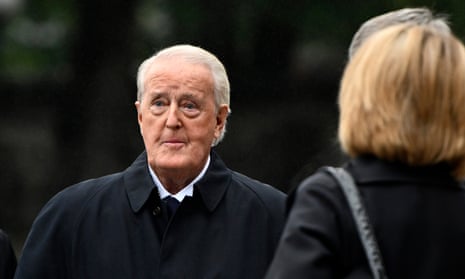Brian Mulroney, the former Canadian prime minister who struck a landmark free trade deal with the US and signed breakthrough environmental accords, but whose legacy was marred by revelations of improper business dealings with an arms dealer, has died at the age of 84.
His daughter announced the death in a social media post.
“On behalf of my mother and our family, it is with great sadness we announce the passing of my father, the Right Honourable Brian Mulroney, Canada’s 18th prime minister. He died peacefully, surrounded by family,” Caroline Mulroney wrote late on Thursday.
Mulroney’s family said last summer he was improving daily after a heart procedure that followed treatment for prostate cancer in early 2023.
Following news of the former prime minister’s death, Canada’s house of commons adjourned early on Thursday evening to mark the event.
“Brian Mulroney loved Canada. I’m devastated to learn of his passing. He never stopped working for Canadians, and he always sought to make this country an even better place to call home,” Canada’s prime minister, Justin Trudeau, said in a statement.
“As we mourn his passing and keep his family and friends in our thoughts, let us also acknowledge – and celebrate – Mr Mulroney’s role in building the modern, dynamic, and prosperous country we all know today,” Trudeau added.
Pierre Poilievre, leader of the Conservative party, called Mulroney “our greatest ever statesmen” and said his economic legacy was “transformational” for Canada.
“He unleashed free enterprise, crushed inflation, restored fiscal sanity and concluded one of the greatest free trade agreements the world has ever seen, which remains largely in place today,” said Poilievre.
Mulroney was the child of a working-class family from the Quebec town of Baie-Comeau, where a pulp mill was the main economic driver. After stints as a corporate lawyer and businessman, Mulroney led the centre-right Progressive Conservatives to a historic win in 1984 over the Liberals of John Turner.
A skilled politician with a gift for public speaking, Mulroney sought to emulate in Canada the conservative leanings of the Ronald Reagan and Margaret Thatcher era by revamping the tax system and selling off government assets.
His nine-year stewardship was marked by negotiations for the Canada-United States Free Trade Agreement in 1988, which helped boost Canadian exports, and the introduction of a goods and services tax in 1991. The tax was enormously unpopular politically but helped fix the government’s finances.

Ontario’ premier, Doug Ford, called Mulroney a “giant” and “role model” for his handling of both domestic and international challenges.
“Canada has lost its ultimate statesman,” Ford said. “Brian was also so generous with his time. When faced with tough decisions, I often leaned on him for advice and benefited from his experience and his political instincts. He was a role model to me and taught me countless lessons on how to be a better leader.”
Jagmeet Singh, leader of the New Democratic party, praised Mulroney’s commitment to environmental stewardship and human rights.
Mulroney worked to end acid rain and ban the use of chlorofluorocarbons, which were destroying the ozone layer.
“He was also a strong opponent of apartheid, leading the efforts to sanction South Africa by Commonwealth nations,” Singh said. Mulroney also worked to tackle the deadly 1984 Ethiopian famine.
“You cannot name a Canadian prime minister who has done as many significant things as I did, because there are none,” the author Peter Newman quoted him as saying in an interview once.
Mulroney also presided over two failed bids to change Canada’s constitution to grant the predominantly French-speaking province of Quebec the status of a distinct society. The efforts, designed to thwart the Quebec independence movement, fostered deep differences between French and English Canada that reverberated politically for decades.
He resigned in 1993 amid record low polling numbers. The Progressive Conservative party was reduced to just two of 295 seats in the House of Commons in an election later that year – easily the biggest defeat in Canadian history – and never recovered politically.
After leaving politics, Mulroney returned to law and became a partner with the Montréal firm Norton Rose Fulbright.
In 1995, a leaked letter revealed that Royal Canadian Mounted Police had accused Mulroney of having taken kickbacks from German-Canadian arms dealer Karlheinz Schreiber on the sale of Airbus airliners to Air Canada in 1988. Mulroney sued the Liberal government and won an apology and damages in 1997.
Mulroney later admitted he had accepted C$225,000 in cash from Schreiber, but defended the significant payment as a consulting fee. A subsequent inquiry into the affair concluded Mulroney had indeed had inappropriate business dealings with Schreiber. Mulroney told the inquiry there was nothing illegal about the payments, but apologised publicly for taking the money.
“My second biggest mistake in life, for which I have no one to blame but myself, is having accepted payments in cash from Karlheinz Schreiber,” he said in 2007. “My biggest mistake in life – by far – was ever agreeing to be introduced to Karlheinz Schreiber in the first place.” Schreiber was subsequently deported to Germany in 2009, where he was given a six-and-a-half-year prison sentence in 2013.
In his 1993 resignation speech, Mulroney acknowledged the tumultuous nature of his premiership, both for the country and his own legacy.
“Whether one agrees with our solutions or not, none will accuse us of having chosen to evade our responsibilities by side-stepping the most controversial issues of our time,” he said. “I’ve done the very best for my country and my party.”
The Associated Press and Reuters contributed reporting
